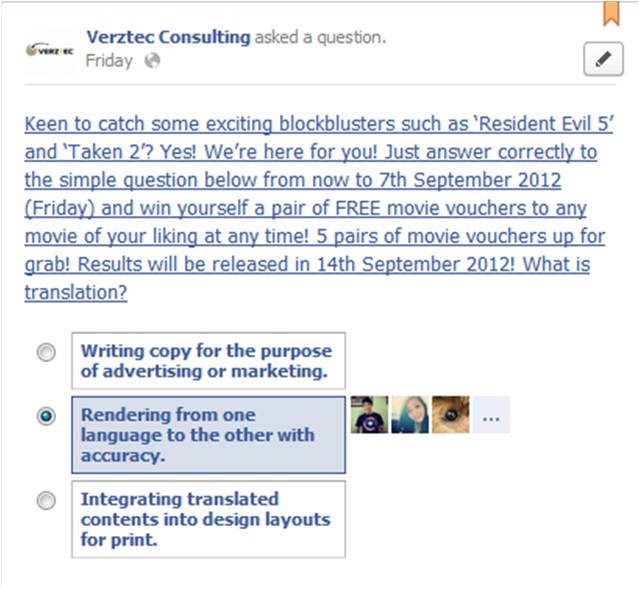Social media platforms such as Facebook, LinkedIn, and Twitter are no longer merely “phenomena.” Within the space of just a few years, they’ve become essential components of many firms’ marketing and public relations plans. But social media is notoriously difficult to monetize. How can language service providers (LSPs) leverage these networks for their companies’ benefit? This brief offers several important guidelines to follow – and some pitfalls to avoid.
Use Social Media Platforms with a Strategic Purpose in Mind
Your company’s social media profiles are a window for the rest of the world to learn more about you. Increasingly, your most recent tweets or status updates might be among the first search results that potential customers find. In other words, their very first impression of your company may come through one of these channels. Most LSPs agree that a social media presence is important, but very few stop to consider what kind of presence they want to create. Consider these questions:
- “Are our customers actually here?” Many companies assume they need to have a social media presence before they’ve conducted the basic research to find out whom they want to reach online. Are the decision-makers and influencers you really want to reach using these platforms? If so, which ones? What type of content are they looking for, and how can you provide something better than what others have on offer? Random thoughts on a wide range of topics will not make you the go-to source of expertise. First, find out where your customers are – what groups they belong to, what pages they are fans of, and which companies or individuals they follow. Then tailor your content to fit those channels.
- “What do we really want our brand to convey?” Social media platforms are not necessarily a place to adhere to a strict brand voice guide – in fact, services like Twitter demand you to keep your tweets concise and to use hashtags (#) to flag your topics so that other users can find them more easily. That said, you still need to develop basic rules regarding what type of image you want to convey. Is the person who controls your brand presence on social media familiar with your most salient marketing messages and your brand attributes? Review your company’s last 30 status updates and tweets. Is there a common theme, or is it scattered? Does the company put forth an image consistent with your marketing goals?
- “What type of information will we provide?” One of the most common mistakes we see LSPs make is that they use social media platforms as soapboxes to brag about themselves. While an occasional “Hooray for us!” update isn’t harmful, a steady stream of self-centered updates will turn people away or simply cause them to ignore you. Instead, focus on what you can deliver that is of value to your customers. What kind of information can you provide to them that will be helpful in their daily work? Can you provide a daily datapoint relevant to their work, or a helpful tip that will make their life easier? Make sure that the resources you link to are worthwhile for your customers and prospects. Don’t link only to your own website – this will be seen as the overt self-promotion that it is. Link to your own web properties only when you really have something valuable to share.
- “What is our network growth strategy?” Social networking is about building networks of individuals with shared interests. What are those interests? Are they clearly stated in your profile or description so that potential contacts can easily find you? Do you conduct a daily search for new contacts with the same interests? Do you use these terms frequently in your status updates? Do you frequently re-tweet items from the “social media celebrities” – individuals who specialize in these fields and boast the largest number of contacts? We’ve spotted many LSPs who focus extensively on the content but not enough on the contacts – meaning that while their updates are good, their network size fails to grow much. This usually means that they are not focusing on the basics – building their networks.
- “Are we engaging our employees and partners?” Invite your staff – including your network of freelancers – to become a fan, connect to you, or follow your firm. Set a goal – can you get 50% of your employees connected to your social media platforms in the next six months? Launch an internal campaign to get as many individuals connected to your company as possible, thereby increasing your reach – and making you a more sought-after contact in the process. Encourage them to use your company hashtag – if need be, set up a quick internal webinar to teach them how to use the platforms and to communicate your goals to them. Consider offering a prize for people who build their networks with the company’s interests in mind – for example, offer an incentive to the first person to connect to 20 localization managers in a given industry.
- “Are we a contact worth keeping?” Don’t forget to give people a reason to connect to you and stay connected – content is not necessarily sufficient. Action and interactivity are more important. Do you have periodic giveaways, raffles, or contests? Are you planning a local get-together? Are you offering a free webinar on a topic that will help the people you most want to reach? Do you provide an interesting brain-teaser or something else that will entertain people and keep them coming back? Make sure whatever information you’re providing is of sufficient quality to keep people returning to you.
Additional Considerations for Social Media-Savvy LSPs
Has your language services business already covered many of the fundamentals? If so, ask yourself the following questions:
- “Are we using the right tools?” If you find yourself struggling to constantly keep your Twitter, Facebook, and LinkedIn profiles updated, chances are you’re failing to take advantage of tools that enable you to automatically send out the same messages across multiple platforms. The mechanics of keeping a prominent place in the social media stream are becoming easier all the time with tools such as Brizzly, Buzzom, HootSuite, Seesmic, TweetDeck, and TwitHive. Today, you can easily populate your Facebook and LinkedIn pages using your Twitter feed with such tools. In fact, they are essential for ensuring a consistent brand presence across multiple social media networks.
- “Is our social media content aligned with SEO?” What search terms and keywords are you using on your web pages and in your press releases? Are you using the same terms in your social media messaging? Many companies fail to recognize that much of the same work they are doing for search engine optimization (SEO) and marketing can yield good results with social media campaigns as well. If you’re not already in close contact with your webmaster about these issues, you need to be. Find out which pages of your website are most popular, and what search terms most frequently bring people to those pages. Make sure you are integrating this information into your social media marketing work.
- “Are we setting micro-goals?” One of the best features of social media for marketers is the ability to track specific information and tie it back to specific campaigns or objectives. Make sure that you are setting micro-goals – for example, achieving a set number of members of a LinkedIn group, a high number of re-tweets or expanded following on Twitter, a specific number of views or embeds of a YouTube video, or a number of fans or Likes on Facebook. You can also use unique URLs to track which channels are most successful. Micro-goals should tie to other concrete goals – such as an increased number of subscribers to a blog and, eventually, the number of actual sales leads generated.
- “Are we engaging younger generations?” Don’t overlook the power of Generation Y when building your networks. The individuals you sell to today are likely in their 30s or 40s. But are you reaching the 20-somethings who will be your customers a few years from now? What about the freelancers who might still be in college now, but could be among your most talented and trusted resources in the years to come? Think creatively to find ways to engage younger generations. Conduct outreach to translation and interpreting programs at universities. Join social media groups for students in the areas that commonly produce individuals with localization manager titles. Find ways to reach these important contacts earlier in their career paths, so that they are fully familiar with your brand – and have positive associations with it – later in life.
- “Is it time for a social media policy?” For better or worse, most organizations have to develop social media policies at some point, or they risk their brand being associated with the random electronic mutterings of employees regarding everything from their favorite soccer team to their spats with family members – none of which will help you accomplish your business objectives. Who will be allowed to represent your brand officially through social media channels? Will anyone review their messages prior to posting? What happens if they leave the company – will you gain control of their public profile, or do they retain it? Are they encouraged to re-tweet, share, or re-purpose your messages? If you do decide to leverage your employees, provide them with detailed examples of what type of behavior is appropriate in these platforms – and what isn’t.
- “Are we over-doing it?” It’s fine to be excited about new ways to reach your target marketers – in fact, social media is in many ways a marketer’s dream, but it can also turn into the target’s nightmare. Beware of bombarding your contacts with too many messages – a steady stream of useful information is great, but if you are not careful, your constant updates could easily be regarded as spam. Take care – and enlist others to obtain feedback about your social media presence. Ask some of your contacts and followers for their suggestions and advice – not just regarding the content but regarding the frequency of its distribution.
Social media is definitely fun, interactive, and dynamic. But we see too many LSPs take the plunge without developing a strategy or thinking about how social media will help them advance their larger marketing objectives. Too often, they have “joined the conversation” without thinking about what they really want or need to say. To build a social media presence that will help your company grow, remember that social media platforms are just part of a much larger marketing strategy. Make sure to keep your overarching marketing goals front and center to determine how social media can help you achieve them.
Verztec is a leading ISO 9001:2008 Global Content Consulting Services Company. Verztec assists companies around the world to design, develop, localize and publish their global communication messages in over 60 languages across various channels. For more information as to how Verztec may partner and assist in your next localization project, kindly contact us at info@verztec.com or call +65 6577 4646 now.
*Sources: Using Social Media to Boost Language Service Business: 26 July 2010 by Common Sense Advisory, Inc.








